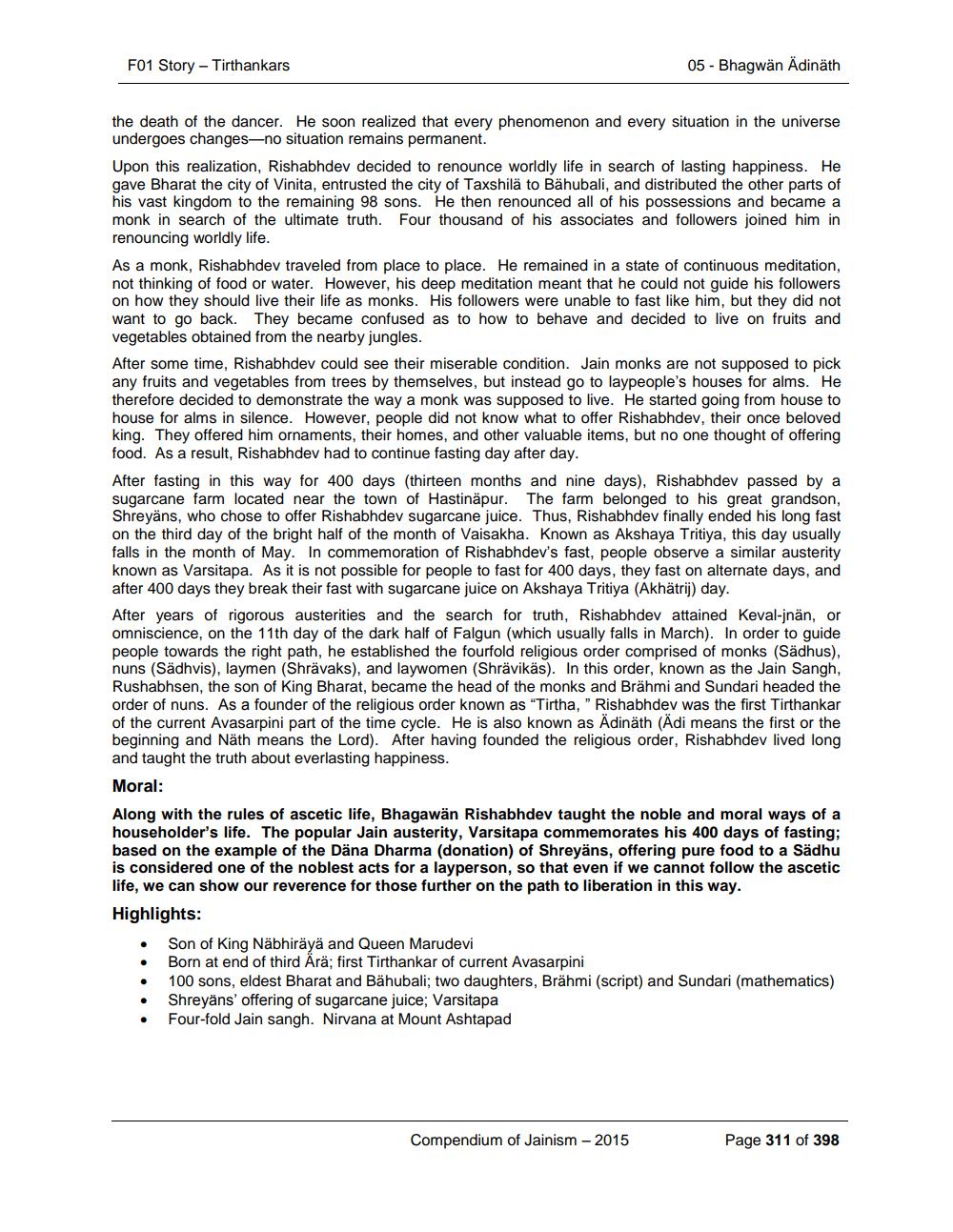________________
F01 Story Tirthankars
the death of the dancer. He soon realized that every phenomenon and every situation in the universe undergoes changes-no situation remains permanent.
05 - Bhagwän Ädinäth
Upon this realization, Rishabhdev decided to renounce worldly life in search of lasting happiness. He gave Bharat the city of Vinita, entrusted the city of Taxshilä to Bähubali, and distributed the other parts of his vast kingdom to the remaining 98 sons. He then renounced all of his possessions and became a monk in search of the ultimate truth. Four thousand of his associates and followers joined him in renouncing worldly life.
As a monk, Rishabhdev traveled from place to place. He remained in a state of continuous meditation, not thinking of food or water. However, his deep meditation meant that he could not guide his followers on how they should live their life as monks. His followers were unable to fast like him, but they did not want to go back. They became confused as to how to behave and decided to live on fruits and vegetables obtained from the nearby jungles.
After some time, Rishabhdev could see their miserable condition. Jain monks are not supposed to pick any fruits and vegetables from trees by themselves, but instead go to laypeople's houses for alms. He therefore decided to demonstrate the way a monk was supposed to live. He started going from house to house for alms in silence. However, people did not know what to offer Rishabhdev, their once beloved king. They offered him ornaments, their homes, and other valuable items, but no one thought of offering food. As a result, Rishabhdev had to continue fasting day after day.
After fasting in this way for 400 days (thirteen months and nine days), Rishabhdev passed by a sugarcane farm located near the town of Hastinäpur. The farm belonged to his great grandson, Shreyäns, who chose to offer Rishabhdev sugarcane juice. Thus, Rishabhdev finally ended his long fast on the third day of the bright half of the month of Vaisakha. Known as Akshaya Tritiya, this day usually falls in the month of May. In commemoration of Rishabhdev's fast, people observe a similar austerity known as Varsitapa. As it is not possible for people to fast for 400 days, they fast on alternate days, and after 400 days they break their fast with sugarcane juice on Akshaya Tritiya (Akhätrij) day.
After years of rigorous austerities and the search for truth, Rishabhdev attained Keval-jnän, or omniscience, on the 11th day of the dark half of Falgun (which usually falls in March). In order to guide people towards the right path, he established the fourfold religious order comprised of monks (Sädhus), nuns (Sädhvis), laymen (Shrävaks), and laywomen (Shrävikäs). In this order, known as the Jain Sangh, Rushabhsen, the son of King Bharat, became the head of the monks and Brähmi and Sundari headed the order of nuns. As a founder of the religious order known as "Tirtha," Rishabhdev was the first Tirthankar of the current Avasarpini part of the time cycle. He is also known as Ädinäth (Ädi means the first or the beginning and Näth means the Lord). After having founded the religious order, Rishabhdev lived long and taught the truth about everlasting happiness.
Moral:
Along with the rules of ascetic life, Bhagawän Rishabhdev taught the noble and moral ways of a householder's life. The popular Jain austerity, Varsitapa commemorates his 400 days of fasting; based on the example of the Däna Dharma (donation) of Shreyäns, offering pure food to a Sädhu is considered one of the noblest acts for a layperson, so that even if we cannot follow the ascetic life, we can show our reverence for those further on the path to liberation in this way.
Highlights:
• Son of King Näbhiräyä and Queen Marudevi
Born at end of third Ärä; first Tirthankar of current Avasarpini
100 sons, eldest Bharat and Bähubali; two daughters, Brähmi (script) and Sundari (mathematics) Shreyäns' offering of sugarcane juice; Varsitapa Four-fold Jain sangh. Nirvana at Mount Ashtapad
Compendium of Jainism - 2015
Page 311 of 398




